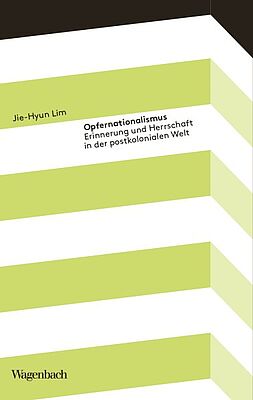
Jie-Hyun Lim, Ph.D.
Professor of History
Hanyang University Seoul
Born in 1959 in Seoul
Studied History and Philosophy at Sogang University Seoul
Project
A Transnational History of Victimhood: Nationalism in East Asia and Europe after the 2nd World War
This study attempts a transnational history of victimhood nationalism in postwar Poland-Israel-Germany and Korea-Japan. The book won't be a pile of victimhood nationalisms surveyed separately within the paradigm of national history. Victimhood nationalism will be articulated from the transnational perspective because victims are unthinkable without victimizers or vice versa. Victimhood nationalism can be traced back to the categorical thinking of the nation inherent in nationalist phenomenology: historical facts are structured by the nationalist epistheme and the reality of the past is constructed by the present idea of the nation. The solidarity within a victimhood community seems the most salient point in postwar Vergangenheitsbewältigung. I would like to suggest the term "victimhood nationalism" as a working hypothesis to explain the competing memories of victimhood in coming to terms with the pasts.The transnationality of victimhood nationalism demands a multilayered histoire croisée approach to comprehend the entangled past of the victimized and victimizers. Victimhood nationalisms among the victimized in Poland, Israel, and Korea will be examined with a focus on the interplay of perpetrators and victims, collective guilt and innocence. It is not difficult to find the outcry of the victimhood nationalism also among victimizers in Germany and Japan. Arguably, a multi-layered histoire croisée analysis would reveal such complexities as the antagonistic complicity of nationalisms between the victimizers and victims, crossed plural relations among the victimizers and victims, victimizers' perception of the collective self as victims, individual victims victimized by the abstraction of "victimhood", and the floating division of the victimizers and victims. In this research based on multilingual sources - Korean, Japanese, Polish, German and English - plural and crossed comparisons will be sought for the purpose of deconstructing victimhood nationalism.
Recommended Reading
Lim, Jie-Hyun and Karen Petrone, ed. Gender Politics and Mass Dictatorship: Global Perspective. Basingstoke: Palgrave Macmillan, 2011. (Mass Dictatorship in the 20th Century Series.)
-. "Victimhood Nationalism in Contested Memories: National Mourning and Global Accountability." In Memory in a Global Age: Discourses, Practices and Trajectories, edited by Aleida Assmann and Sebastian Conrad. Basingstoke: Palgrave Macmillan, 2010.
-. "Narody-ofiary i ich megalomania." Wiez 2, 3 (2010): 616-617.
Colloquium, 21.02.2012
Victimhood-Nationalism in Contested Memories: From National Mourning to Global Accountability
This study tries to articulate "victimhood-nationalism" as a working hypothesis to explicate competing memories of victimhood in the postwar Vergangenheitsbewältigung in the transnational space of Europe and East Asia. The dialectical interplay of global and national memory will be explored with a focus on the dichotomy of perpetrators and victims, collective guilt and innocence, national and cosmopolitan memory, actors and objects, over- and de-contextualization, historical conformism and presentism. The historical space in this study is not an individual nation but an intersection of the memory loci of entangled history. Thus, the book will not be a mere compilation of victimhood-nationalisms surveyed separately within the national history framework. A national history of victimhood-nationalism implies a tautology resulting from and contributing to the nationalist phenomenology that constructs past memories upon the present idea of nation. Just as victims without perpetrators are inconceivable, contested memories of victimhood-nationalism cannot be understood outside a global frame of reference. Indeed, memories of victimhood have become more contested with the emergence of new transnational memory communities that appeal to border-crossing connections and shared pasts. The transnationality of victimhood-nationalism demands a histoire croisée approach to excavate the multi-layered past. By drawing on the entangled pasts of the political production, consumption and distribution of the victimhood representations between Korea and Japan, and between Poland, Germany and Israel, I seek to highlight the transnational history of victimhood-nationalism and hope to make a contribution to the deconstruction of this phenomenon by drawing plural, crossed and parallel comparisons and by questioning the national division between victimizers and victimized.
Publications from the Fellow Library
Lim, Jie-Hyun (Berlin, 2024)
Opfernationalismus : Erinnerung und Herrschaft in der postkolonialen Welt Global Easts. Remembering, Imagining, Mobilizing
Lim, Jie-Hyun (Houndmills, Basingstoke, Hampshire, 2011)
Gender politics and mass dictatorship : global perspectives Taejung tokchae wa yŏsŏng
Lim, Jie-Hyun (2010)
Victimhood nationalism and history reconciliation in East Asia
Lim, Jie-Hyun (2010)
Victimhood nationalism in contested memories : national mourning and global accountability
Lim, Jie-Hyun (2010)
Narody-ofiary i ich megalomania
Lim, Jie-Hyun (Seoul, 2010)
Lim, Jie-Hyun (Sŏul-si, 2010)
Taejung tokchae wa yŏsŏng : tongwŏn kwa haebang ŭi kiro esŏ Gender politics and mass dictatorship

